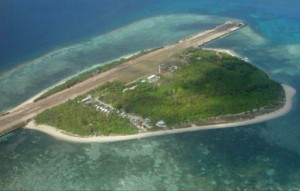Palace to oppose China’s air zone
MANILA, Philippines—The Aquino administration will oppose through diplomatic channels any “air defense identification zone” to be put up by China over the West Philippine Sea (South China Sea), Malacañang said on Wednesday.
Speaking to reporters at the Palace, Communications Secretary Herminio Coloma said the Philippines would insist on freedom of navigation in the disputed maritime territory, “whether air transport or maritime transport” and “the airspace above it.”
Coloma was referring to the statement of Chinese Ambassador to the Philippines Ma Keqing late Monday that it was the Chinese government’s right to decide where and when to set up a new air defense identification zone after the one it declared in the East China Sea on Nov. 23.
Ma was answering reporters’ questions about China’s declaring a similar zone in the West Philippine Sea, a prospect that Foreign Secretary Albert del Rosario spoke about in a television interview on Nov. 28.
“There’s this threat that China will control the airspace [in the West Philippine Sea],” Del Rosario said in the interview on ABS-CBN.
China declared the air defense zone over the East China Sea to bolster its claim to the Japan-administered Senkaku Islands, known to the Chinese as Diaoyu Islands.
China and the Philippines are disputing ownership of islands, islets, reefs and atolls in the West Philippine Sea, with Beijing asserting its claims by sending multivessel fishing expeditions to the disputed territories accompanied by armed patrol ships.
UN arbitration
With nothing to match Beijing’s military muscle, Manila took the territorial dispute to the United Nations in January for arbitration, angering the Chinese who insist on bilateral negotiations to resolve the controversy.
Besides the Philippines, Vietnam, Brunei, Malaysia and Taiwan also claim territories in the West Philippine Sea, nearly all of which Beijing insists is part of its territory.
Like the Philippines, Vietnam stridently opposes China’s claim to most of the regional waters. China’s answer to them includes authorizing the maritime police of Hainan province beginning last January to board and seize foreign vessels that “illegally enter” Chinese waters.
The latest Chinese action, following escalation of the dispute with Japan in the Senkakus, is the declaration of the air defense zone in the East China Sea.
Asked whether the Aquino administration viewed a Chinese air defense zone in the West Philippine Sea as a threat, Coloma, said: “The Department of Foreign Affairs (DFA) has already made a statement on that. Our firm resolve against any impediment to freedom of navigation, whether air transport or maritime transport, remains in waters covered by [the West Philippine Sea], and the airspace over it.”
Coloma reiterated the DFA’s position that “there should not be a premise or reason to escalate the anxiety or tension” in the disputed waters, as this could trigger “concerns about civil aviation and nautical safety.”
Rules-based approach
These concerns, he said, would be the “practical consequence” of any move that would escalate tensions in the region.
“We continue to insist on a rules-based approach there and take into consideration the welfare of all [the claimants],” Coloma said.
“And we join the other Asean (Association of Southeast Asian Nations) countries in the hope that the promulgation of [a] code of conduct (in the sea) will be expedited in the light of recent developments,” he added, referring to China’s declaration of the East China Sea air defense zone, which Japan, the United States, the Philippines and other countries oppose.
President Aquino has not given fresh instructions to the DFA concerning Ma’s statement, Coloma said.
“Suffice it to say that the DFA continues to monitor the situation closely and will adopt appropriate actions as needed,” he said.
Japan trip
President Aquino will travel to Tokyo next week for a visit aimed at strengthening relations with Japan and other Asean countries.
Besides the United States, Japan is the Philippines’ strategic defense partner and top trade partner.
A Palace advisory shows that the President will attend the 40th Asean-Japan “commemorative summit” in Tokyo from Dec. 12 to 15.
The summit, which will celebrate the Asean-Japan “Friendship and Cooperation” partnership, is an opportunity for Asian leaders to engage in wide-ranging discussions of issues affecting the region.
President Aquino supports the proposed code of conduct in the West Philippine Sea to prevent the rivalry for territory among the claimants from erupting into armed confrontations.
Pending conclusion of the code, Aquino is pressing for adherence to a 2002 agreement for the observance of the status quo by all the claimants to territory in the sea.
The United States, Japan and other countries support the proposed code of conduct between Asean and China.
RELATED STORIES:
China eyes air defense zone in West PH Se
For comprehensive coverage, in-depth analysis, visit our special page for West Philippine Sea updates. Stay informed with articles, videos, and expert opinions.
